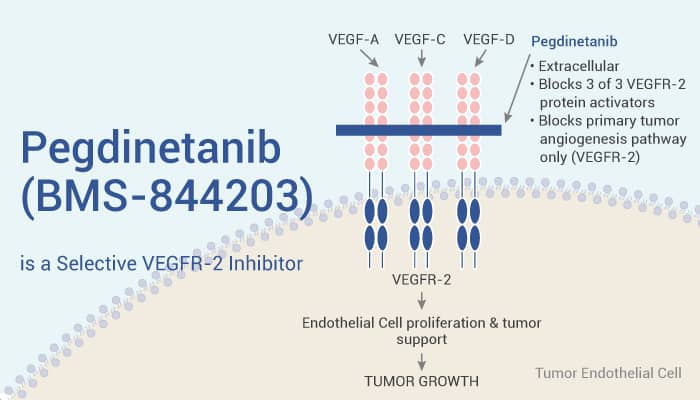Pegdinetanib (BMS-844203), an anti-angiogenic therapeutic agent, exemplifies a new class of targeted biologics called Adnectins. Adnectins are genetically engineered variants of the tenth type III domain of human fibronectin. Firstly, Adnectins are small proteins and have a high affinity to antibodies. Secondly, they are not glycosylated and have no disulfide bonds. So, Adnectins have the ease of engineering and selection with desired binding and pharmaceutical properties. It can be used for the targeted therapies of protein engineering.
Angiogenesis is a key contributor to tumor growth. Vascular endothelial growth factor (VEGF)-A and its isoforms are pro-angiogenic factors. VEGFA can bind and activate the receptor VEGFR-2. They lead to the autophosphorylation of tyrosine residues at the carboxy-terminal of the receptor when VEGFA binds to VEGFR-2. Then initiate cell signaling, vasculogenesis, and angiogenesis.
Pegdinetanib is a vascular endothelial growth factor receptor (VEGFR)-2 inhibitor.

Pegdinetanib is a PEGylated Adnectin, that binds potently and specifically to VEGFR-2. On the one hand, Pegdinetanib binds human VEGFR-2 with high affinity with a K<sub>p</sub> value of 11 nM. It blocks the activation of VEGFR-2 by its three ligands, VEGF-A, -C and -D. On the other hand, Pegdinetanib is selective for VEGFR-2 and does not bind VEGFR-1 or VEGFR-3 at concentrations. Besides, Pegdinetanib can block VEGF-induced phosphorylation of VEGFR-2 and mitogen-activated protein kinase in human umbilical vascular endothelial cells. In vivo, Pegdinetanib has anti-tumor effects. It can significantly inhibit the growth of human tumor xenograft models of colon carcinoma and glioblastoma at doses of 15-60 mg/kg administered 3 times/week.
In conclusion, Pegdinetanib is a VEGFR-2 inhibitor with anti-angiogenic and anti-tumor effects.
Reference:
[1] Schiff D, et al. Invest New Drugs. 2015 Feb;33(1):247-53.